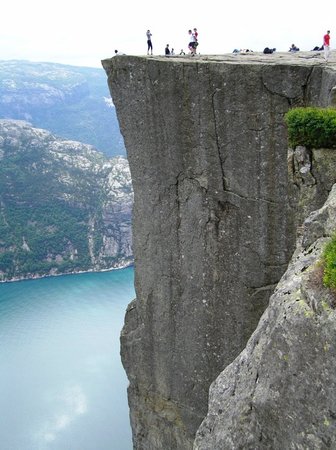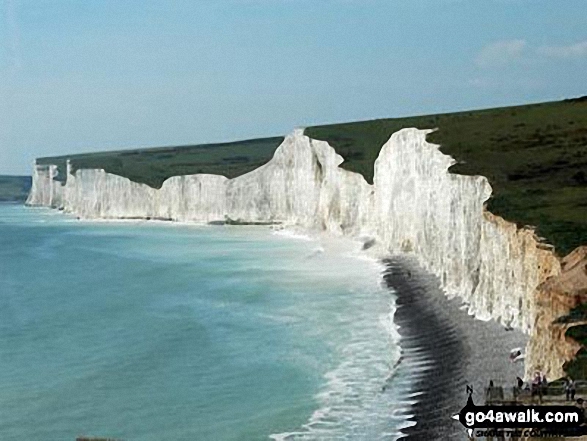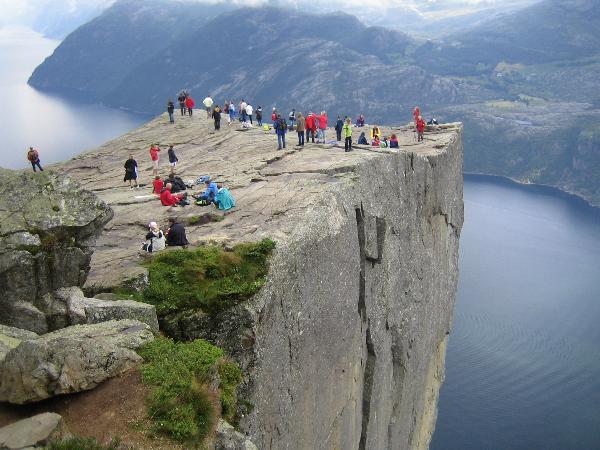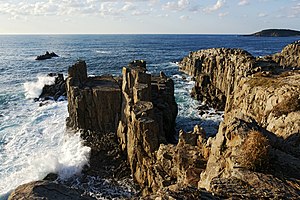Cliffs are near vertical rock exposures and formations. They are produced by the processes of erosion and weathering over time. They are found on coasts, in mountainous areas, and along rivers. If found on sea, it is called as sea cliff.
A sea cliff is an erosional landform, produced by wave action, which is either at the seaward edge of the coast or at the landward side, and which denotes the inner limit of the beach erosion. They are created for millions of years, and this slow and creative process produced some of the world’s magnificent sites. Here are some ten of the world’s marvelous sea cliffs.
Cliffs of Moher
 Found near Doolin in County Clare, Ireland, the Cliffs of Moher rise 120 meters (394 ft) above the Atlantic Ocean at Hag’s Head. The cliffs consist mainly of beds of Namurian shale and sandstone. There are many animals living on the cliffs, including an estimated 30,000 birds. Due to its breath-taking beauty, the Cliffs of Mother rank as one of the most popular tourist destinations in Ireland and topped the list of attractions in 2006. In 2009, the Cliffs were named one of the 28 finalists in the “New Seven Wonders of Nature.” They have also appeared in several films like Leap Year (2010) and Harry Potter and the Half-Blood Prince (2009). (image source)
Found near Doolin in County Clare, Ireland, the Cliffs of Moher rise 120 meters (394 ft) above the Atlantic Ocean at Hag’s Head. The cliffs consist mainly of beds of Namurian shale and sandstone. There are many animals living on the cliffs, including an estimated 30,000 birds. Due to its breath-taking beauty, the Cliffs of Mother rank as one of the most popular tourist destinations in Ireland and topped the list of attractions in 2006. In 2009, the Cliffs were named one of the 28 finalists in the “New Seven Wonders of Nature.” They have also appeared in several films like Leap Year (2010) and Harry Potter and the Half-Blood Prince (2009). (image source)White Cliffs of Dover
 Stretching east and west from the town of Dover in the British county of Kent, the White Cliffs of Dover rise 107 meters (351 ft) high. The cliff face can be seen across the English Channel from France. The cliffs are made of chalk (pure white calcium carbonate) accentuated by streaks of black flint. The chalk bed consists of remains of shells from microscopic creatures living on the seabed over 70 million years ago. Several cliff nesting birds nest on the cliff face, including fulmar and colonies of black-legged kittiwakes. (image source)
Stretching east and west from the town of Dover in the British county of Kent, the White Cliffs of Dover rise 107 meters (351 ft) high. The cliff face can be seen across the English Channel from France. The cliffs are made of chalk (pure white calcium carbonate) accentuated by streaks of black flint. The chalk bed consists of remains of shells from microscopic creatures living on the seabed over 70 million years ago. Several cliff nesting birds nest on the cliff face, including fulmar and colonies of black-legged kittiwakes. (image source)Preikestolen
 Also known as Prekestolen, Preacher’s Pulpit, Pulpit Rock and locally as Hyvlatonna, the Preikestolen is a massive cliff above Lysefjorden in Forsand, Ryfylke, Norway. It is about 604 meters (1982 ft) high. A remarkable feature of the cliff is its almost flat top that measures approximately 25 by 25 meters square. It overlooks the dense and green valleys of the region of Rogaland. The mountains surrounding the cliff rise up to 843 meters. The Preikestolen is one of the most visited natural tourist attractions in Norway and attracts almost 100,000 visitors in the summer. (image source)
Also known as Prekestolen, Preacher’s Pulpit, Pulpit Rock and locally as Hyvlatonna, the Preikestolen is a massive cliff above Lysefjorden in Forsand, Ryfylke, Norway. It is about 604 meters (1982 ft) high. A remarkable feature of the cliff is its almost flat top that measures approximately 25 by 25 meters square. It overlooks the dense and green valleys of the region of Rogaland. The mountains surrounding the cliff rise up to 843 meters. The Preikestolen is one of the most visited natural tourist attractions in Norway and attracts almost 100,000 visitors in the summer. (image source)Beachy Head and the Seven Sisters
Rising to 162 meters (530 ft) above sea level, the Beachy Head is the highest chalk sea cliff in Britain. It is located close to the town of Eastbourne in the county of East Sussex, immediately east of the Seven Sisters. The cliff is made of layers of chalk, formed between 65 and 100 million years ago. In the 17th century, it had a reputation for people to attempt suicide, around 20 each year. This figure dropped to seven fatalities in the recent years. (image source)
 Not far from Beachy Head and just by the English Channel are the chalk cliffs of the Seven Sisters. They are remnants of dry valleys in the chalk South Downs. They have been featured in movies like Robin Hood: Prince of Thieves and Atonement. (image source)
Not far from Beachy Head and just by the English Channel are the chalk cliffs of the Seven Sisters. They are remnants of dry valleys in the chalk South Downs. They have been featured in movies like Robin Hood: Prince of Thieves and Atonement. (image source)Kalaupapa Cliffs
The Kalaupapa Cliffs in Hawaii are the highest sea cliffs in the world, dropping about 1,010 meters (3,315 ft) into the Pacific Ocean. They are found on the island of Molokai. The cliffs, like the whole Kalaupapa peninsula, are volcanic in origin, created when lava erupted from the ocean floor near Kauhako Crater. Because of the steep cliffs and surrounding ocean, Kaulapapa cannot be reached by car and visitors can only reach it by a trail. Some workers at the village commute on foot daily on this trail. The cliffs are featured in the movie Jurassic Park III. (image source)
The Twelve Apostles
The Twelve Apostles is a collection of eight rock stacks off the shore of the Port Campbell National Park by the Great Ocean Road in Victoria, Australia. The cliffs are approximately 45 meters high. They are made of soft miocene limestone rocks which were gradually eroded by harsh weather conditions. On 2005, a 50-meter tall stack collapsed, leaving eight remaining. The rate of erosion at the base of the limestone pillars is approximately 2 cm per year. The cliffs’ proximity to one another has made the site a popular tourist attraction. (image source)
Cabo Girão
Cabo Girao stretches 1 km long along the coast of the southern part of Madeira Island in Portugal. it is diamond-shaped and has a height of 560 meters (1,849 ft) to 589 meters (1,932 ft) above sea level. It is a popular lookout and a starting point for hikers. It is also the location of the Encosta Cabo Girão, a complex of 120 apartments. Another noted feature of the cliff is the Chapel of Nossa Senhora da Fatima which was built in 1974 to replace the much smaller one built in 1931. Located below the cliffs are terraced fields, Fajãs de Cabo Girão, which were accessible only by boats before. In 2003, a cable car was installed on the slope so that farmers can reach the fields. (image source)
Étretat
Étretat is a commune in the Seine-Maritime department in the Haute-Normandie region in northern France. It is famous for its cliff, including three natural arches and the pointed “needle”. Two of the arches can be seen from the town, a third requires a walk at low tide. (image source)
Tōjinbō
Tōjinbō is a collection of surreal, eerie basaltic cliffs on the Sea of Japan in Japan. Stretching 1 km long and rising 70 meters high, it is located in the Fukui Prefecture. The cliffs’ rocks were formed 12 to 13 million years ago due to several volcanic activities, and the cliffs’ shape is influenced by erosion from sea waves. Accordingly, as many as 25 people commit suicide annually on the cliffs. (image source)
Møns Klint
Situated in the eastern coast of the Danish Island of Møn in the Baltic Sea, Møns Klint is a series of bright chalk cliffs stretching 6 km from the park of Liselund in the north to the lighthouse in the south. Some cliffs rose to 120 meters. Because of the special nature of the chalky soil, the cliffs are home to many rare flora and fauna species like the tall lady orchid, the peregrine falcon, and the large blue butterfly. The cliffs and adjacent park are now protected as a nature reserve. Møns Klint is a famous tourist attraction from across Europe with some 250,000 visitors a year. (image source)
Source:














very interesting heart breaking wonders
ReplyDeletewow..great post. ilike it.another post my favourite added.thanks for sharing with us.
ReplyDeleteBest Online Drug Store
شركات نقل عفش بالمدينة المنورة
ReplyDeleteشركات نقل عفش بمكة
شركات نقل عفش
شركة تنظيف خزانات بالمدينة المنورة
شركات تنظيف بمكة
شركة مكافحة حشرات
Find Out More address important source click this site read you can find out more
ReplyDelete